Pope Francis’ general audience in the Paul VI Hall at the Vatican, Nov. 3, 2021. / Vatican Media.
Vatican City, Nov 3, 2021 / 04:30 am (CNA).
Pope Francis said on Wednesday that fraternal correction must always be guided by love.
Speaking at the general audience in the Vatican’s Paul VI Hall on Nov. 3, the pope reflected on the Apostle Paul’s advice to the early Christians to correct others “in a spirit of gentleness.”
“The supreme rule regarding fraternal correction is love: to want the good of our brothers and sisters,” the pope said.
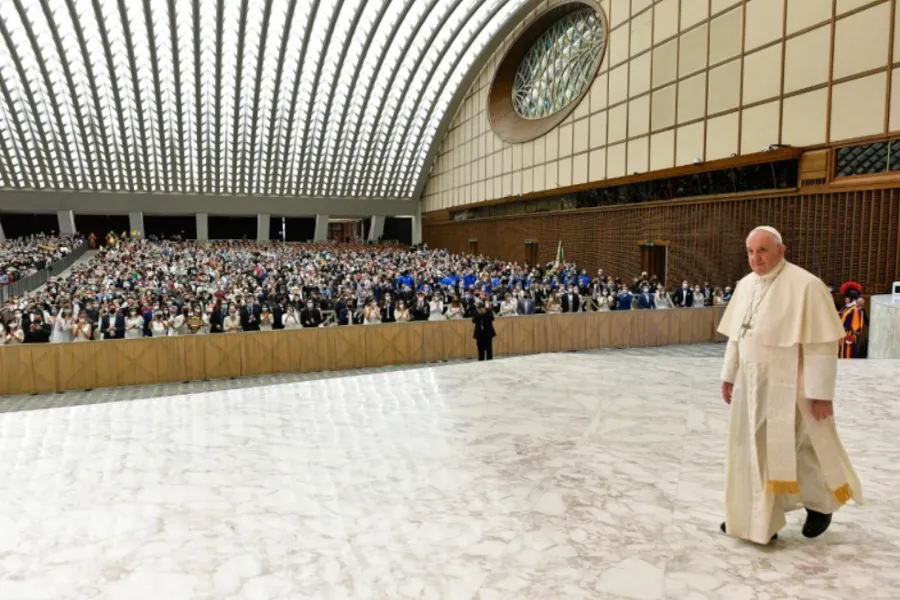
The Catholic Encyclopedia defines fraternal correction as “the admonishing of one’s neighbor by a private individual with the purpose of reforming him or, if possible, preventing his sinful indulgence.”
The pope reflected on the practice in his live-streamed address, the 14th in his cycle of catechesis on St. Paul’s Epistle to the Galatians.
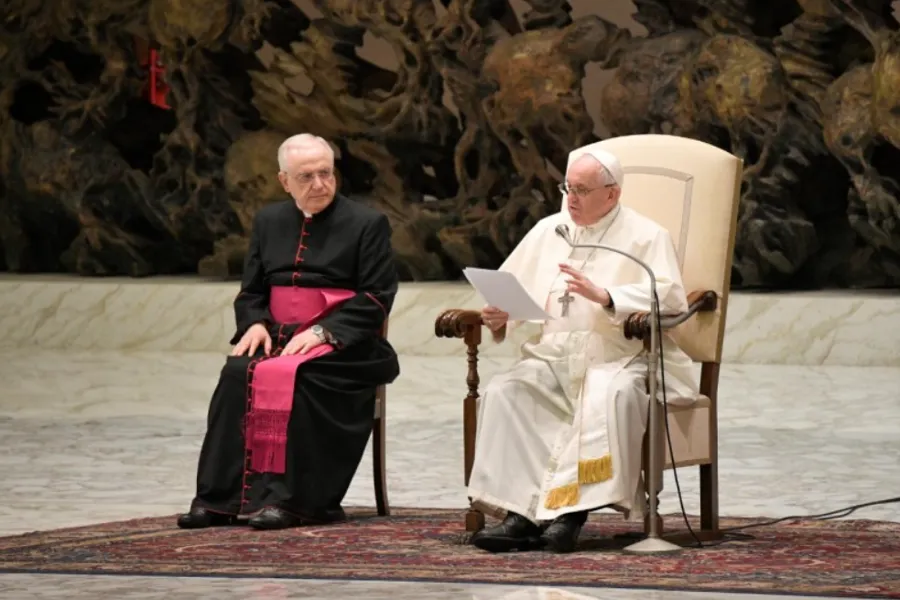
At the beginning of the audience, priests read out Galatians 5:16-17, 25 in various languages, a passage in which the Apostle urges the community in Galatia, a region in modern-day Turkey, to “walk according to the Spirit.”
“In fact, it is exciting, but demanding, to build up the community according to the way indicated by the Apostle,” the pope commented.
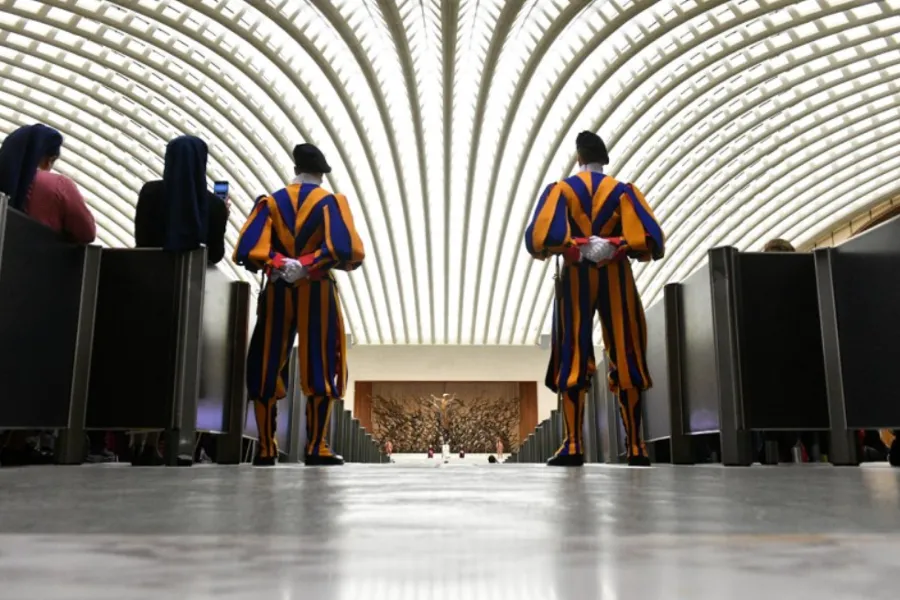
“The ‘desires of the flesh,’ ‘the temptations,’ we can say, that all of us have — that is, our jealousies, prejudices, hypocrisies and resentments continue to make themselves felt — and having recourse to a rigid set of precepts can be an easy temptation.”
“But doing this means straying from the path of freedom, and instead of climbing to the top, it means returning down below. In the first place, journeying along the way of the Spirit requires giving space to grace and charity.”

The pope noted that in Galatians 6:1-2, St. Paul urged Christians to bear each other’s burdens and, when a community member fell, to restore them with gentleness.
“Quite different than gossiping, like when we see something and we talk behind the person’s back about it, right?” he said.
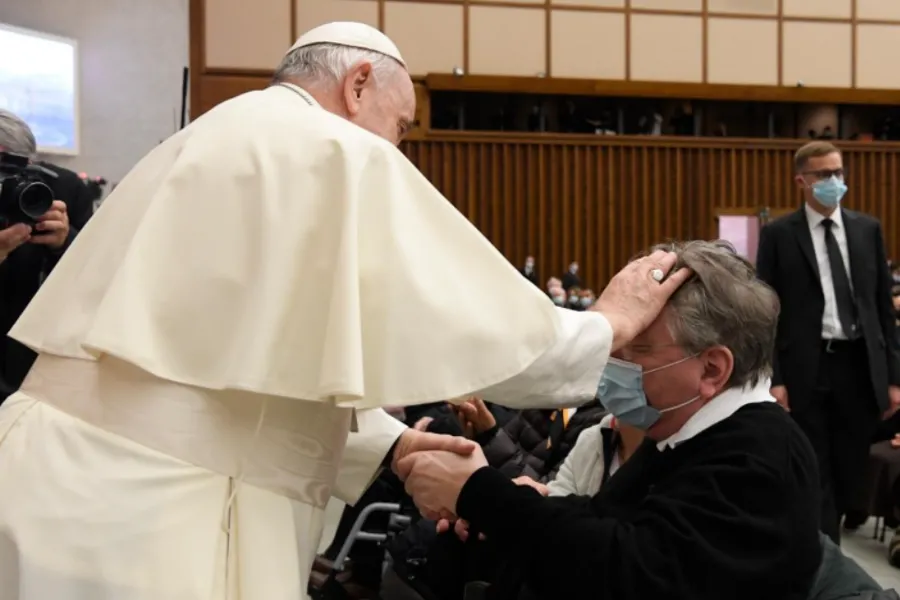
“To gossip about our neighbor. No, this is not according to the Spirit. What is according to the Spirit is being gentle with a brother or sister when correcting him or her and keeping watch over ourselves so as not to fall into those sins, that is, humility.”
He went on: “In effect, when we are tempted to judge others badly, as often happens, we must rather reflect on our own weakness. How easy it is to criticize others! But there are people who seem to have a degree in gossip. Each and every day they criticize others. Take a look at yourself!”
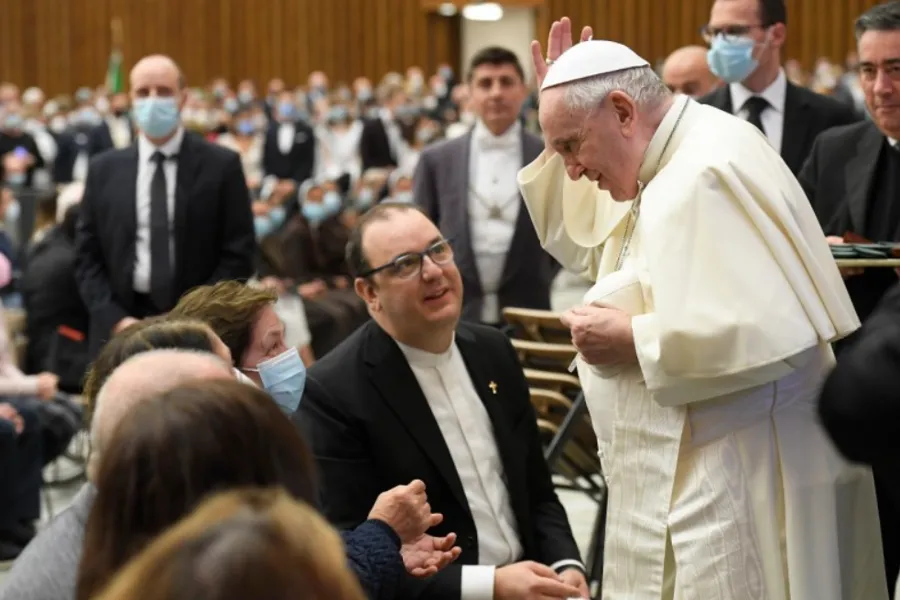
“It is good to ask ourselves what drives us to correct a brother or a sister, and if we are not in some way co-responsible for their mistake.”
He said that the Holy Spirit not only invites Christians to show gentleness, but also to bear others’ burdens.
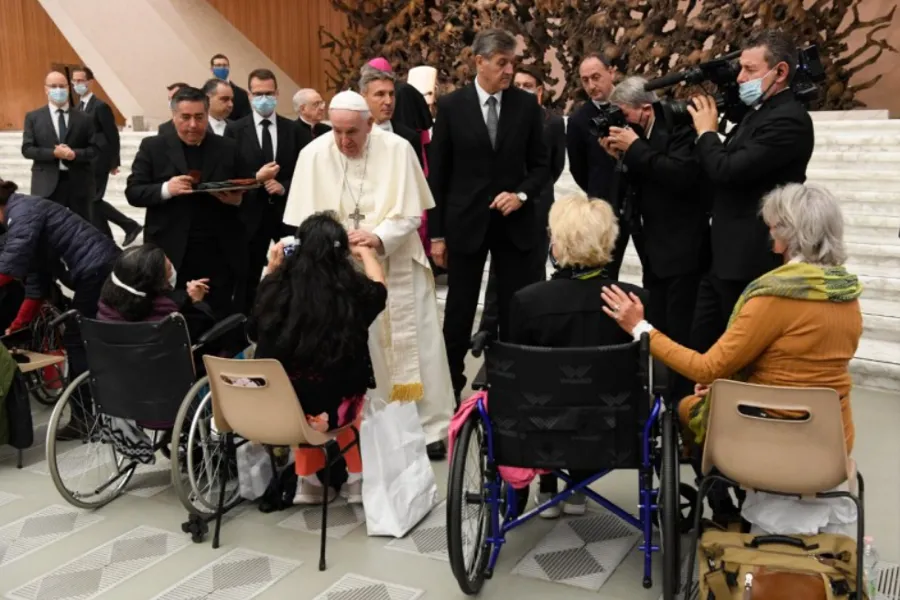
He cited St. Augustine of Hippo, the fourth-century Doctor of the Church, who wrote concerning the same scriptural passage: “Therefore, brothers and sisters, whenever someone is caught in some fault, […] correct him in this way, gently, gently. And if you raise your voice, love within. If you encourage, if you present yourself as a father, if you reprove, if you are severe, love.”
The pope said: “It takes a lot of time to also tolerate others’ problems, others’ defects in the silence of prayer, so as to find the right way to help them to correct themselves.”
“And this is not easy. The easiest path is to gossip. Talking behind someone else’s back as if I am perfect. And this should not be done. Gentleness. Patience. Prayer. Proximity.”
In his catechesis, Pope Francis also reflected on the meaning of St. Paul’s exhortation to “walk according to the Holy Spirit.”
He said that the Apostle understood the Christian life to be a journey in the footsteps of Jesus, shunning egotism, which he called the “desire of the flesh.”
“The Spirit is the guide for this journey along the way of Christ, a stupendous but difficult journey that begins in Baptism and lasts our entire lives. We can think of it as a long excursion on the mountain heights: it is breath-taking, the destination is attractive, but it requires a lot of effort and tenaciousness,” the pope observed.
He said that the image of climbing a mountain can help Catholics grasp Paul’s idea of walking with the Spirit.
“They are expressions indicating an action, a movement, a dynamism that prevents us from halting at the first difficulties, but elicit confidence in the ‘strength that comes from on high,’” the pope said, quoting from the second-century Christian text The Shepherd of Hermas.
“Trodding along this way, the Christian acquires a positive vision of life. This does not mean that the evil present in the world disappears, or that the negative impulses of our egoism and pride diminish,” he said.
“Rather, it means that belief in God is always stronger than our resistance and greater than our sins. And this is important: to believe that God is greater, always. Greater than our resistances, greater than our sins.”
The pope noted that as St. Paul describes the arduous journey of Christian life, he “abandons the verb in the imperative – ‘walk’ – and uses the indicative ‘we’: ‘let us walk according to the Spirit.’”
“St. Paul feels this exhortation is necessary for himself as well. Even though he knows that Christ lives in him, he is also convinced that he has not yet reached the goal, the top of the mountain,” he observed.
“The Apostle does not place himself above his community. He does not say: ‘I am the leader; you are those others; I have come from high up on the mountain and you are on the way.’ He does not say this, but places himself in the midst of the journey everyone is on in order to provide a concrete example of how much it is necessary to obey God, corresponding better and better to the Spirit’s guidance.”
“And how beautiful it is when we find pastors who journey with their people, who do not get tired – ‘No, I am more important, I am a pastor. You…,’ ‘I am a priest,’ ‘I am a bishop,’ with their noses in the air. No: pastors who journey with the people. This is very beautiful. It does the soul good.”
After the address, a precis of the pope’s catechesis was read out in seven languages. After each summary, he greeted members of each language group.
He said: “I greet the English-speaking visitors taking part in today’s audience, especially those from England and the United States of America, as well as the group of American military chaplains meeting in Rome in these days. Upon all of you, and your families, I invoke the joy and peace of the Lord. God bless you!”
Addressing Polish speakers, he said: “Yesterday, in commemorating the Memorial of All the Faithful Departed, we commended to God’s mercy the people dear to us, especially those who await our prayerful assistance to enter into the joy of eternal life.”
“Prayer for the dead, strengthened by the hope given by the Risen Christ, is not a celebration of the cult of death, but an act of love towards our brothers and sisters and a bearing of one another’s burdens. I bless you from the bottom of my heart!”
The audience concluded with the recitation of the Our Father and the Apostolic Blessing.
Credit: Source link




